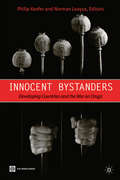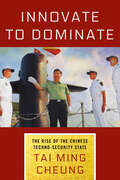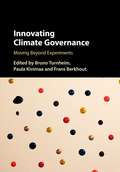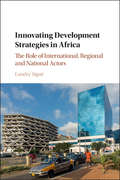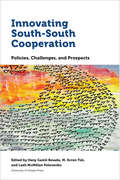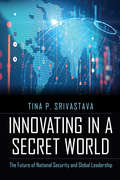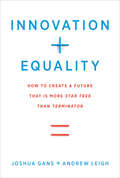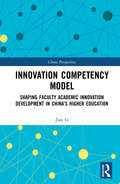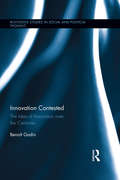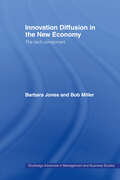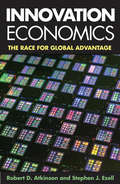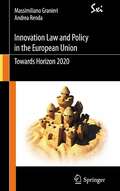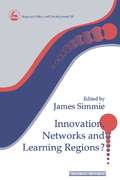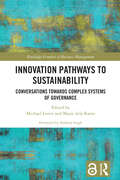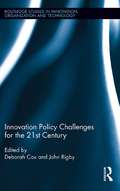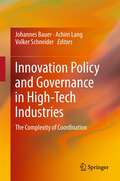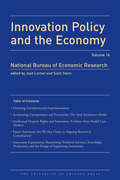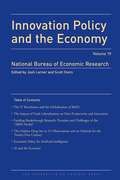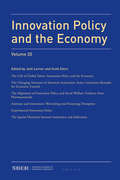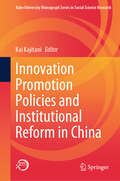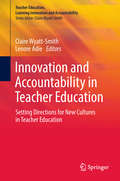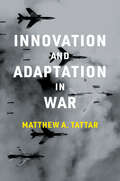- Table View
- List View
Innere Sicherheit
by Bernhard FrevelIn diesem Lehrbuch werden die Grundzüge des Politikfelds Innere Sicherheit dargelegt, der Sicherheitsbegriff diskutiert, Sicherheitsprobleme in den Bereichen Kriminalität, Extremismus und Terrorismus beleuchtet, Felder und Akteure der Inneren Sicherheit vorgestellt sowie aktuelle und grundlegende Probleme zur Gewährung der Inneren Sicherheit betrachtet. Die kompakte Einführung schließt mit einem Ausblick, der aktuelle Probleme des Politikfelds problemorientiert diskutiert.Das Buch zeigt wissenschaftliche Betrachtungsweisen und Analysewege auf, die in Zeiten der häufig emotional geführten Debatten über die Sicherheitslage gefordert sind.
Innocence and Victimhood
by Elissa HelmsThe 1992-95 war in Bosnia-Herzegovina following the dissolution of socialist Yugoslavia became notorious for "ethnic cleansing" and mass rapes targeting the Bosniac (Bosnian Muslim) population. Postwar social and political processes have continued to be dominated by competing nationalisms representing Bosniacs, Serbs, and Croats, as well as those supporting a multiethnic Bosnian state, in which narratives of victimhood take center stage, often in gendered form. Elissa Helms shows that in the aftermath of the war, initiatives by and for Bosnian women perpetuated and complicated dominant images of women as victims and peacemakers in a conflict and political system led by men. In a sober corrective to such accounts, she offers a critical look at the politics of women's activism and gendered nationalism in a postwar and postsocialist society. Drawing on ethnographic research spanning fifteen years, "Innocence and Victimhood" demonstrates how women's activists and NGOs responded to, challenged, and often reinforced essentialist images in affirmative ways, utilizing the moral purity associated with the position of victimhood to bolster social claims, shape political visions, pursue foreign funding, and wage campaigns for postwar justice. Deeply sensitive to the suffering at the heart of Bosnian women's (and men's) wartime experiences, this book also reveals the limitations to strategies that emphasize innocence and victimhood.
Innocent Abroad: An Intimate Account of American Peace Diplomacy in the Middle East
by Martin IndykMaking peace in the long-troubled Middle East is likely to be one of the top priorities of the next American president. He will need to take account of the important lessons from past attempts, which are described and analyzed here in a gripping book by a renowned expert who served twice as U.S. ambassador to Israel and as Middle East adviser to President Clinton. Martin Indyk draws on his many years of intense involvement in the region to provide the inside story of the last time the United States employed sustained diplomacy to end the Arab-Israeli conflict and change the behavior of rogue regimes in Iraq and Iran. Innocent Abroad is an insightful history and a poignant memoir. Indyk provides a fascinating examination of the ironic consequences when American naïveté meets Middle Eastern cynicism in the region's political bazaars. He dissects the very different strategies of Bill Clinton and George W. Bush to explain why they both faced such difficulties remaking the Middle East in their images of a more peaceful or democratic place. He provides new details of the breakdown of the Arab-Israeli peace talks at Camp David, of the CIA's failure to overthrow Saddam Hussein, and of Clinton's attempts to negotiate with Iran's president. Indyk takes us inside the Oval Office, the Situation Room, the palaces of Arab potentates, and the offices of Israeli prime ministers. He draws intimate portraits of the American, Israeli, and Arab leaders he worked with, including Israel's Yitzhak Rabin, Ehud Barak, and Ariel Sharon; the PLO's Yasser Arafat; Egypt's Hosni Mubarak; and Syria's Hafez al-Asad. He describes in vivid detail high-level meetings, demonstrating how difficult it is for American presidents to understand the motives and intentions of Middle Eastern leaders and how easy it is for them to miss those rare moments when these leaders are willing to act in ways that can produce breakthroughs to peace. Innocent Abroad is an extraordinarily candid and enthralling account, crucially important in grasping the obstacles that have confounded the efforts of recent presidents. As a new administration takes power, this experienced diplomat distills the lessons of past failures to chart a new way forward that will be required reading.
Innocent Bystanders: Developing Countries and the War on Drugs
by Norman Loayza Philip KeeferThe drug policies of wealthy consuming countries emphasize criminalization, interdiction, and eradication. Such extreme responses to social challenges risk unintended, costly consequences. The evidence presented in this volume is that these consequences are high in the case of current drug policies, particularly for poor transit and producer countries. These costs include the deaths of thousands in the conflict between drug cartels and security forces, political instability, and the infiltration of criminal elements into governments, on the one hand; and increased narcotics use in countries that would not otherwise have been targeted by drug suppliers. Despite such costs, extreme policies could be worthwhile if their benefits were significantly higher than those of more moderate, less costly policies. The authors review the evidence on the benefits of current policies and find that they are clouded in uncertainty: eradication appears to have no permanent effect on supply; the evidence on criminalization does not exclude either the possibility that its effects on drug consumption are low, or that they are high. Uncertainty over benefits and the high costs of current policies relative to alternatives justifies greater emphasis on lower cost policies and more conscientious and better-funded efforts to assess the benefits of all policies.
Innovate to Dominate: The Rise of the Chinese Techno-Security State
by Tai Ming CheungIn Innovate to Dominate, Tai Ming Cheung offers insight into why, how, and whether China will overtake the United States to become the world's preeminent technological and security power. This examination of the means and ends of China's quest for techno-security supremacy is required reading for anyone looking for clues as to the long-term direction of the global order. The techno-security domain, Cheung argues, is where national security, innovation, and economic development converge, and it has become the center of power and prosperity in the twenty-first century. China's paramount leader Xi Jinping recognizes that effectively harnessing the complex interactions among security, innovation, and development is essential in enabling China to compete for global dominance. Cheung offers a richly detailed account of how China is building a potent techno-security state. In Innovate to Dominate he takes readers from the strategic vision guiding this transformation to the nuts-and-bolts of policy implementation. The state-led top-down mobilizational model that China is pursuing has been a winning formula so far, but the sternest test is ahead as China begins to compete head-to-head with the United States and aims to surpass its archrival by mid-century if not sooner. Innovate to Dominate is a timely and analytically rigorous examination of the key strategies guiding China's transformation of its capabilities in the national, technological, military, and security spheres and how this is taking place. Cheung authoritatively addresses the burning questions being asked in capitals around the world: Can China become the dominant global techno-security power? And if so, when?
Innovating Climate Governance: Moving Beyond Experiments
by Bruno Turnheim Paula Kivimaa Frans BerkhoutAfter the perceived failure of global approaches to tackling climate change, enthusiasm for local climate initiatives has blossomed worldwide, suggesting a more experimental approach to climate governance. Innovating Climate Governance: Moving Beyond Experiments looks critically at climate governance experimentation, focusing on how experimental outcomes become embedded in practices, rules and norms. Policy which encourages local action on climate change rather than global burden sharing suggests a radically different approach to tackling climate issues. This volume reflects on what climate governance experiments achieve, as well as what happens after and beyond these experiments. A bottom-up, polycentric approach is analysed, exploring the outcomes of climate experiments and how they can have broader, transformative effects in society. Contributions offer a wide range of approaches and cover more than fifty empirical cases internationally, making this an ideal resource for academics and practitioners involved in studying, developing and evaluating climate governance.
Innovating Development Strategies in Africa: The Role of International, Regional and National Actors
by Landry SignéDuring the second half of the twentieth century, African states shifted away from state-led development strategies, and are now moving towards a strategy of regional economic integration. In this book, Landry Signé explores the key drivers of African policy and economic transformation, proposing a preeminent explanation of policy innovations in Africa through the examination of postcolonial strategies for economic development. Scholars and practitioners in fields as varied as development studies, political science and public policy, economics, sociology and African studies will benefit from Signé's unprecedented comparative analysis, including detailed cases from the often understudied Francophone Africa. First studying why, how and when institutional or policy change occurs in Africa, Signé explores the role of international, regional and national actors in making African economic development strategies from 1960 to date, highlighting the economic transformations of the twenty-first century. Proposes one of the most systematic studies of African economic development strategies since the 1960s, ideal for those seeking to understand the modern climate of economic development in Africa. Offers numerous case studies on the often neglected and unexplored Francophone Africa, which will appeal to those seeking a better understanding of the region. Renews discussion of the relatively unexplored topic of political innovation, and offers a systematic framework to study it.
Innovating South-South Cooperation: Policies, Challenges and Prospects (Studies in International Development and Globalization)
by Arjan De Haan Andrew Grant Manmohan Agarwal Karin Costa Vazquez Cristina D’Alessandro Barassou Diawara Natasha Fernando Ariane Goetz Kobena Hanson Christina Sandra Lengfelder Ward Warmerdam Karolina Werner Aylin Yardimci Ajarat Bada Simon MevelThis book presents novel approaches to further SouthSouth Cooperation (SSC) on a global scale. The evolving aid architecture and mounting development challenges demand an urgent and critical review of existing aid modalities, policy-making and forums for international cooperation. With the rise of emerging powers, we face an important question: ls the changing global order transforming the nature of development cooperation? Promoting equitable broad-based growth in order to alleviate poverty, calls for a new understanding of the principles of development assistance, good governance, transparency, ownership, and accountability. This book is published in English. - Les changements en matière d’aide internationale et les défis soulevés par les crises alimentaires, financières et énergétiques exigent un examen critique des conventions actuelles en matière d’assistance et d’élaboration de politiques et de forums décisionnels en coopération internationale. À la lumière de la montée de pouvoirs émergents, une analyse de la manière dont un ordre mondial en mutation transforme la nature de la coopération pour le développement s’impose. La promotion d’une croissance économique équitable et d’une réduction de la pauvreté exige une nouvelle compréhension de l’aide au développement et une gouvernance, transparence, propriété et imputabilité optimales. L’avenir de la Coopération Sud-Sud repose sur de nombreux facteurs, comme l’amélioration des moyens de communication et le partage des connaissances entre pays partenaires, l’adoption d’une approche analytique pour définir les biens publics régionaux et mondiaux, l’identification et l’évaluation des bonnes et des mauvaises pratiques et la fusion des priorités économiques et sociales. Au moyen d'études de cas, les auteurs proposent des approches novatrices pour promouvoir la Coopération Sud-Sud et établir des politiques de développement international efficaces. Ce livre est publié en anglais.
Innovating in a Secret World: The Future of National Security and Global Leadership
by Tina P. SrivastavaOur national security increasingly depends on access to the most sophisticated and advanced technology. Yet the next time we set out to capture a terrorist leader, we may fail. Why? The answer lies in a conflict between two worlds. One is the dynamic, global, commercial world with its thriving innovations. The other is the world of national security, in which innovation is a matter of life or death. The conflict is about secrecy.Innovating in a Secret World is a detailed examination of the U.S. government and innovation landscapes and of the current trends in often secret national security–related research and development (R&D). Based on case studies, detailed research, and interviews with executives at Fortune 500s, startup entrepreneurs, and military directors and program managers, this accessible and timely book is a must-read. Tina P. Srivastava evaluates whether the strategy of technology innovation in the world of national security leaves certain innovations behind or unintentionally precludes certain classes of innovators from participating. She identifies the unintended consequences and emergent behaviors of this conflict. This examination unfolds in a complex, dynamic system that includes the legal framework in which technology innovation must exist. For more than a decade Srivastava has been on the front lines of cutting-edge technology innovation. She suggests focusing on an emerging class of R&D strategy called “open innovation”—a strategy that broadens participation in innovation beyond an individual organization or division traditionally assigned to perform R&D activities. Through compelling stories of commercial and early government applications, she shows how open technology innovation strategies can enable, accelerate, and enhance technology innovation. Successful incorporation of open innovation into the previously closed U.S. government R&D landscape can yield profound benefits to both national security and global leadership.
Innovation + Equality: How to Create a Future That Is More Star Trek Than Terminator (The\mit Press Ser.)
by Joshua Gans Andrew LeighHow to get more innovation and more equality.Is economic inequality the price we pay for innovation? The amazing technological advances of the last two decades—in such areas as artificial intelligence, genetics, and materials—have benefited society collectively and rewarded innovators handsomely: we get cool smartphones and technology moguls become billionaires. This contributes to a growing wealth gap; in the United States; the wealth controlled by the top 0.1 percent of households equals that of the bottom ninety percent. Is this the inevitable cost of an innovation-driven economy? Economist Joshua Gans and policy maker Andrew Leigh make the case that pursuing innovation does not mean giving up on equality—precisely the opposite. In this book, they outline ways that society can become both more entrepreneurial and more egalitarian. All innovation entails uncertainty; there's no way to predict which new technologies will catch on. Therefore, Gans and Leigh argue, rather than betting on the future of particular professions, we should consider policies that embrace uncertainty and protect people from unfavorable outcomes. To this end, they suggest policies that promote both innovation and equality. If we encourage innovation in the right way, our future can look more like the cheerful techno-utopia of Star Trek than the dark techno-dystopia of The Terminator.
Innovation Competency Model: Shaping Faculty Academic Innovation Development in China’s Higher Education (China Perspectives)
by Jian LiContributing to the discussion over China’s higher education development, this book takes a theoretical approach to address the topic of university academics’ innovation by introducing an academic innovation competency model, exploring the contexts, concepts and practices. The innovation competency model comprises three interdependent dimensions, including the academic internal drive vitality, the academic synthesizing refined ability and the academic suspected and introspective ability. By enriching the theory of professional development of university teachers, these three dimensions will help advance the reform of college personnel systems and ultimately improve the quality of China's higher education. The book will be valuable to researchers, students and stakeholders hoping to learn about education reform in China, or to those who study higher education management and comparative education.
Innovation Contested: The Idea of Innovation Over the Centuries (Routledge Studies in Social and Political Thought)
by Benoît GodinInnovation is everywhere. In the world of goods (technology), but also in the world of words: innovation is discussed in the scientific and technical literature, but also in the social sciences and humanities. Innovation is also a central idea in the popular imaginary, in the media and in public policy. Innovation has become the emblem of the modern society and a panacea for resolving many problems. Today, innovation is spontaneously understood as technological innovation because of its contribution to economic "progress". Yet for 2,500 years, innovation had nothing to do with economics in a positive sense. Innovation was pejorative and political. It was a contested idea in philosophy, religion, politics and social affairs. Innovation only got de-contested in the last century. This occurred gradually beginning after the French revolution. Innovation shifted from a vice to a virtue. Innovation became an instrument for achieving political and social goals. In this book, Benoît Godin lucidly examines the representations and meaning(s) of innovation over time, its diverse uses, and the contexts in which the concept emerged and changed. This history is organized around three periods or episteme: the prohibition episteme, the instrument episteme, and the value episteme.
Innovation Diffusion in the New Economy: The Tacit Component (Routledge Advances In Management And Business Studies)
by Barbara Jones Bob MillerThis book unites discussions of the philosophical and scientific basis of tacit knowledge.The authors give an overview of the theories of tacit knowledge and explain how these relate to a background of philosophical, neurological and pedagogic literature. The importance of tacit knowledge for evolutionary models of innovation is analyzed raising qu
Innovation Economics
by Robert D. AtkinsonThis important book delivers a critical wake-up call: a fierce global race for innovation advantage is under way, and while other nations are making support for technology and innovation a central tenet of their economic strategies and policies, America lacks a robust innovation policy. What does this portend? Robert Atkinson and Stephen Ezell, widely respected economic thinkers, report on profound new forces that are shaping the global economy—forces that favor nations with innovation-based economies and innovation policies. Unless the United States enacts public policies to reflect this reality, Americans face the relatively lower standards of living associated with a noncompetitive national economy. The authors explore how a weak innovation economy not only contributed to the Great Recession but is delaying America's recovery from it and how innovation in the United States compares with that in other developed and developing nations. Atkinson and Ezell then lay out a detailed, pragmatic road map for America to regain its global innovation advantage by 2020, as well as maximize the global supply of innovation and promote sustainable globalization.
Innovation Law and Policy in the European Union: Towards Horizon 2020
by Massimiliano Granieri Andrea RendaThe book provides a critical overview of innovation policy in Europe and a synopsis of the current institutional framework of Europe shaped after the Europe2020 strategy and in view of the upcoming Horizon2020 agenda. What emerges is a rather gloomy outlook for the future of Europe's innovation, unless EU institutions and Member States will decide to streamline existing policies and build a "layered" model of innovation, in which governments act as investors in key enabling infrastructure such as ICT and education; as enablers of large technology markets where researchers and entrepreneurs can meet; and as purchasers of innovation when key societal challenges are at stake. The book contains proposals for the future innovation strategy of the EU and a specific analysis of areas such as the unitary patent, the transfer of technology (particularly as far as climate-related technologies and IP markets are concerned), standardization, and the digital agenda.
Innovation Networks and Learning Regions? (Regions and Cities #No. 18)
by James SimmeInnovation, Networks and Learning Regions? address key issues of understanding in contemporary economic geography and local economic policy making in cities and regions in the advanced economies. Developing the idea that innovation is the primary driving force behind economic change and growth, the international range of contributors stress the importance of knowledge and information as the 'raw materials' of innovation. They examine the ways in which these elements may be acquired and linked through networks, and demonstrate that there are empirical examples of innovative areas which do not have highly developed networks yet appear to be relatively successful in terms of local economic growth. In so doing, they raise crucial questions about the ways in which regions or localities might be described as truly 'learning' areas, and about the sustainability of future economic and quality of life success based on innovation and high-technology.
Innovation Pathways to Sustainability: Conversations Towards Complex Systems of Governance (Routledge Frontiers of Business Management)
by Michael Lester Marie Dela RamaThe book offers insights into reconciling innovation with sustainability and identifying key stakeholders responsible for the reconciliation. Through conversations with experts in various fields, the intersection of innovation, sustainability, governance and complex systems in a rapidly changing climate-driven world is discussed.Countries around the world face the urgent existential challenge to tackle climate change and CO2 emissions. In its discussions of case studies of key economic sectors in Australia, this book focuses on the emerging experience with harnessing innovation to sustainability. The interdisciplinary approach to the complexity of climate change and policy making provides readers an opportunity for thoughtful discussions and lessons to be learnt from multiple angles.This is a vital resource for scholars in climate studies, innovation and sustainability that also confronts important challenges facing policymakers, government and society.
Innovation Policy Challenges for the 21st Century (Routledge Studies in Innovation, Organizations and Technology)
by Deborah Cox John RigbyAs the economies of western countries move from primarily resource-based to knowledge-based, and trade liberalization limits what governments can do through direct action, the landscape of innovation is changing and policymakers must react accordingly. This exciting new book examines the challenges that policy makers face in responding to a new environment. The book addresses how governments are now seeking to drive innovation through new forms of R&D policies, through public procurement, skills development, entrepreneurship and innovation culture to name but a few of the approaches. Innovation Policy Challenges for the 21st Century explores these and other contemporary issues in innovation, reviewing the state of the art literature and consolidating current thinking at the frontiers of innovation. The volume debates and presents scattered and anonymous material in a coherent way, with a particular focus is on ‘hot topics’ in the field of innovation studies that have been previously under-researched. The book is divided into four key themes: government as a key actor in the innovation process, entrepreneurs as innovators, skills and competences required to maintain and improve innovation performance in Europe and finally, the wider context in which innovation policy develops.
Innovation Policy and Governance in High-Tech Industries: The Complexity of Coordination
by Johannes Bauer Achim Lang Volker SchneiderThe book examines the conditions for successful high-technology policy from theoretical and empirical perspectives. It enhances the predominant national systems of innovation approach to innovation policy with concepts based on new developments in the governance of complex systems and processes. The conceptual framework of complex networks and systems is used to examine national policy approaches in countries that have created environments conducive to high-technology industries as well as individual high-technology sectors, such as biotechnology, alternative energy, and aerospace. Theoretical and empirical contributions are synthesised into lessons for high-tech policy and further research.
Innovation Policy and the Economy 2015: Volume 16 (National Bureau of Economic Research Innovation Policy and the Economy)
by The University of Chicago PressThe papers in the sixteenth volume of the National Bureau of Economic Research’s Innovation Policy and the Economy offer insights into the changing landscape of innovation by highlighting recent developments in the financing of innovation and entrepreneurship and in the economics of innovation and intellectual property. The first chapter, by Ramana Nanda and Matthew Rhodes-Kropf, explores the process of experimentation in the context of financing of technology start-ups by venture capitalists. The second, by Yael Hochberg, also analyzes the role of entrepreneurial experimentation by systematically examining the rise of start-up accelerators. The third chapter, by Heidi Williams, studies the relationship between the strength of intellectual property rights and innovation. The fourth paper, by Fiona Scott Morton and Carl Shapiro discusses recent changes to the patent system and whether they align the rewards from intellectual property with the marginal contributions made by innovators and other stakeholders. The final chapter, by Karim Lakhani and Kevin Boudreau, focuses on the potential use of field innovation experiments and contests to inform innovation policy and management. Together, these essays continue to highlight the importance of economic theory and empirical analysis in innovation policy research.
Innovation Policy and the Economy, 2018: Volume 19 (National Bureau of Economic Research Innovation Policy and the Economy #19)
by The University of Chicago PressThis volume highlights the interaction between public policy and innovation. The first chapter documents the dramatic globalization of R&D and how this development has affected the efforts of U.S. multinationals to operate on the global technology frontier. The next chapter synthesizes research on the impact of trade shocks on innovation and explains how these shocks’ effects depend on the firms, industries, and countries affected. The third chapter examines the Advanced Research Projects Agency (ARPA) model of research management—an approach to funding and managing high-risk R&D—and offers a method for diagnosing which research efforts are “ARPA-able.” Next is a study of the Orphan Drug Act and the key changes in the U.S. healthcare landscape and in drug discovery and development since its passage in 1983. The next two chapters focus on artificial intelligence (AI). One describes how AI diffuses through the economy and discusses implications for economic inequality, antitrust, and intellectual property. The other investigates issues surrounding firm competition and labor force participation, such as data portability and a Universal Basic Income, and evaluates ways to address these issues.
Innovation Policy and the Economy, 2019: Volume 20 (National Bureau of Economic Research Innovation Policy and the Economy)
by The University of Chicago PressThe chapters in this twentieth volume of Innovation Policy and the Economy present research on the interactions among public policy, the innovation process, and the economy. One explores changes in the ability of the U.S. to attract talented foreign workers and the role of sponsoring institutions in shaping immigration policy. Another explains how the division of innovative labor between research universities and corporate labs affected productivity growth and the transformation of knowledge into new products and processes. A third reviews different innovation policies and their performance in the pharmaceutical sector. Next is a chapter on the effects of competition policy on innovation, “creative destruction,” and economic growth. A fifth chapter studies how experimental policy design can be a cost-effective way to attain program goals. The last chapter examines geographic disparities in innovation, joblessness, and technological dynamism and studies how reallocation of grants and geographically targeted entrepreneurship policy could affect labor supply and welfare.
Innovation Promotion Policies and Institutional Reform in China (Kobe University Monograph Series in Social Science Research)
by Kai KajitaniThis book focuses on the political economy behind innovation in China's new industrial sectors, particularly the effects of policies and government regulation in the absence of the rule of law. In its analysis, the book aims to elucidate the mechanisms that generate innovation from multiple perspectives while utilizing insights from political science and law. The analysis in this book focuses on the following three points. First, by examining Guizhou Province's Big-data industry promotion policy, "import substitution digitization" policy, and government intellectual property strategy, we seek to empirically clarify the extent to which Chinese government industrial policy has stimulated innovation. Next, we examine in detail the issues surrounding the "rule of law" in China regarding introducing anti-monopoly laws for digital platform companies and developing the intellectual property court system. Third, it focuses on the role played by local governments in industrial policy, including the impact of industrial guidance funds on the efficiency of the regional financial sector and the impact of local bond issuance on the effectiveness of resource allocation among regions.
Innovation and Accountability in Teacher Education: Setting Directions for New Cultures in Teacher Education (Teacher Education, Learning Innovation and Accountability)
by Claire Wyatt-Smith Lenore AdieThis is the foundational book for the new series, Teacher Education, Learning Innovation and Accountability. The book canvasses research, practice and policy perspectives in teacher education across diverse geographic, social and political contexts. It explores the lifespan of teacher development from initial preparation through to graduate classroom practice as it occurs in an intensifying culture of standards and regulation. The characterization of initial teacher education (ITE) in a crucible of change permeates throughout the book. The chapters open up new ways of thinking about innovation and accountability in ITE and the professionalization of teaching, exploring fundamental questions, such as “Who are the actors in teacher preparation and how do they interact? How can we learn about the quality of teacher education? Where can we hear the voices of teacher educators and preservice teachers, as well as school-based teacher educators? What are the new and emerging roles of others in teacher education who have not been involved previously, including employing authorities?” (p. 22). While the book provides responses to these and other provocative questions, it also offers new insights into innovative teacher education from a wide range of policy and practice contexts.
Innovation and Adaptation in War (Belfer Center Studies in International Security)
by Matthew A. TattarAn analysis of advances in military technology that illustrates the importance of organizational flexibility in both an attacker&’s innovations and an opponent&’s adaptations.How important is military innovation in determining outcomes during armed conflict? In Innovation and Adaptation in War, Matthew Tattar questions the conventional wisdom that, to succeed, military organizations must innovate early and often. Because successful methods of warfare are soon widely imitated or countered on the international stage, the advantages of a particular innovation quickly evaporate. Therefore, Tattar argues, large-scale innovations at the cost of organizational flexibility and the ability to adapt to an adversary&’s innovations may not be the optimal path—not just because force readiness is vital but also because innovation does not provide as long-lasting and decisive an advantage as may have been previously thought.Although other scholars have analyzed the sources of military innovation, Tattar is the first to focus on the relationship between innovation and specific military outcomes. Looking at several different types of military organizations and many different types of battles, he draws on theoretical works, in-depth historical research, and case studies, and finds that the initial advantages that are generated by innovation disappear far too rapidly in wartime for militaries to depend on them for victory. Furthermore, as Tattar demonstrates, emphasizing innovation in defense planning at the expense of organizational flexibility can have significant negative consequences. The decisive factor in successful adaptation, more often than not, is a well-positioned and flexible organization. Providing both a new framework for studying military innovation and a comprehensive review of the current literature in this field, Innovation and Adaptation in War offers crucial policymaking insights into when and under what circumstances militaries should innovate and adapt.



